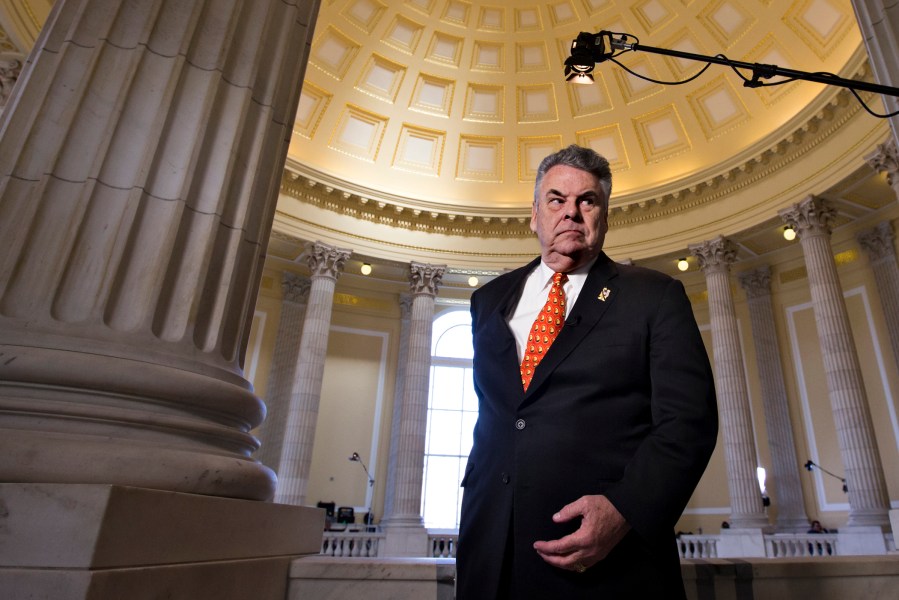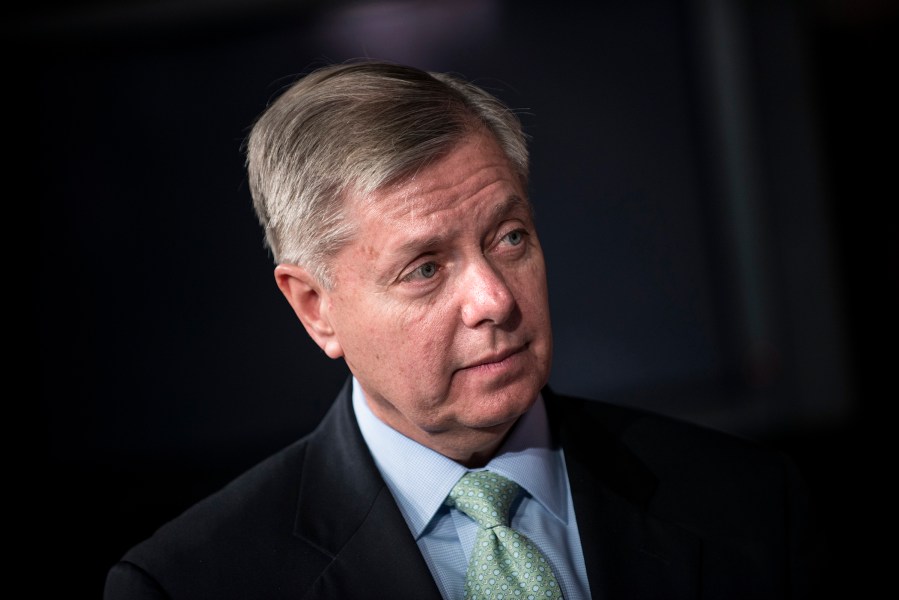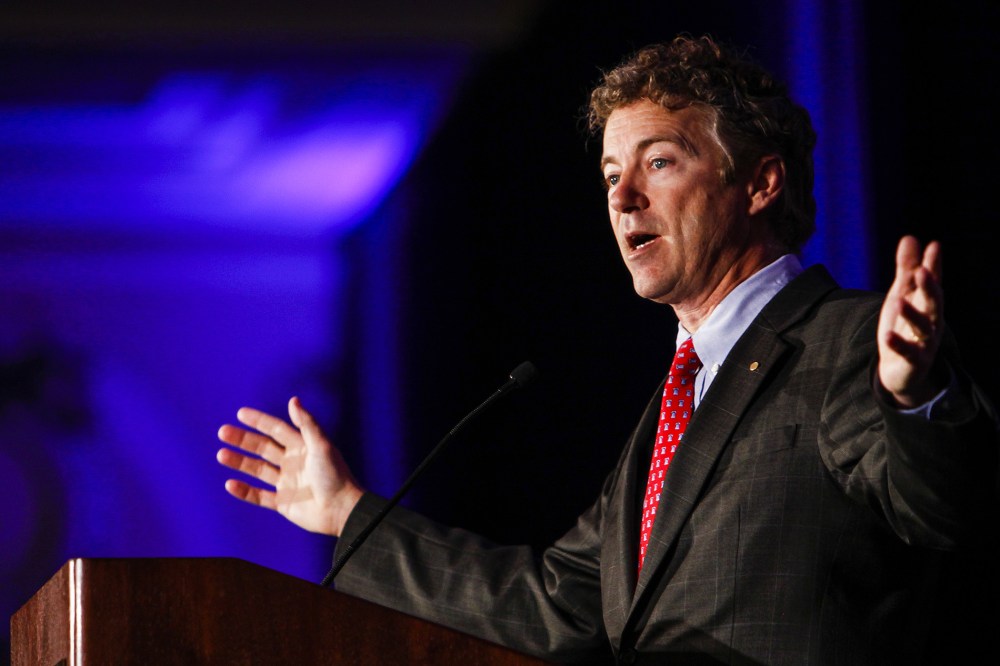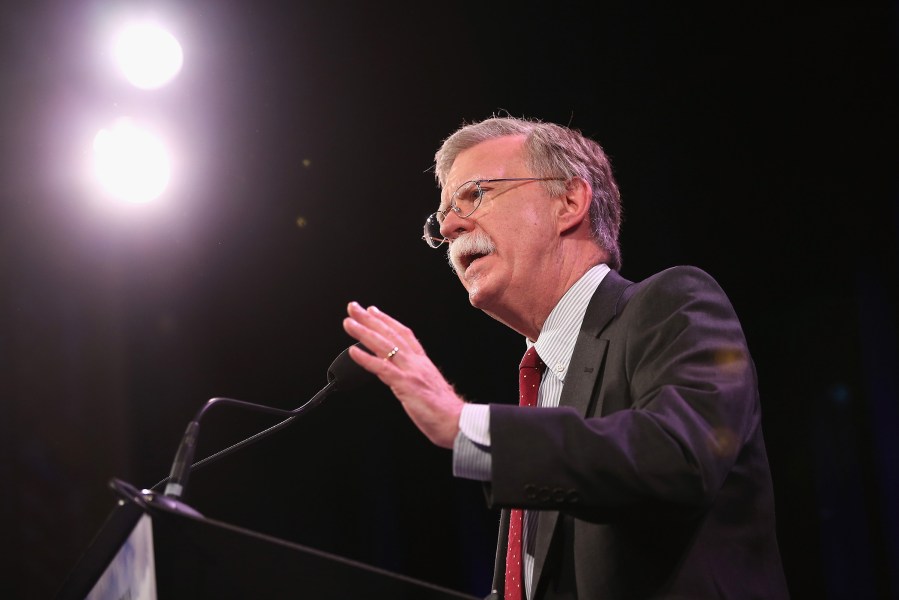New York Rep. Pete King knows he’s a long shot for the GOP presidential nomination. He has little national following, no campaign organization, and must constantly remind people he’s considering a run to keep his name in the mix at all.
But if King doesn’t make it to the White House, he’ll happily settle for another victory: Making sure Rand Paul doesn’t get there either.
“I want to take advantage of the opportunity of my name being there to get around and raise the issues I want, which is mainly foreign policy, national security, counterterrorism and really preventing the Rand Paul’s and Ted Cruz’s from taking over the party,” King told msnbc.
Paul’s brand of libertarianism is intensely skeptical of foreign wars and foreign aid alike and outright hostile to sweeping federal powers authorized after 9/11 to prevent future attacks. The Kentucky senator’s philosophy makes him the freshest 2016 GOP hopeful, but it’s also raised the ire of the party’s old school interventionists, some of whom are so horrified at the prospect of a Paul presidency that they’ll do anything to stop him – even if it means running themselves.

King is one of at least three Republicans considering security-focused 2016 bids that would put them on a collision course with Paul and, to a lesser degree, Cruz. South Carolina Sen. Lindsey Graham, a leading hawk, recently formed an exploratory committee ahead of a possible run. Former United Nations Ambassador John Bolton is looking at a White House bid as well and spoke last month at Rep. Steve King’s GOP candidate showcase in Iowa.
In interviews with msnbc, King and Bolton each made clear that Paul’s rise within the party loomed large in their thinking.
“That really generated my concern,” said King, who has likened Paul to infamous Nazi sympathizer Charles Lindbergh. “What he was appealing to the Republican Party, to me, would be disastrous policy wise and also politically.”
Bolton, who spoke to msnbc after his speech in Des Moines, said he planned to force Paul to account for his “neo-isolationism” (a label Paul rejects) should they meet on the primary trail.
Related: Rand Paul throws shade at 2016 rivals
Graham is less eager to put himself so explicitly in the anti-Paul camp. Asked by msnbc what impact Paul’s ambitions had on his decision to explore a run he responded: “Zero.”
“It’s all about my vision for the country and national security and economic security,” Graham said.
Still, as one of Paul’s top antagonists in the Senate, it’s easy to imagine Graham taking a similar tack. He’s derided Paul as part of an “isolationist movement in the party” and called his positions “to the left of Obama”– the ultimate GOP insult. Paul is already launching preemptive strikes, telling radio host Laura Ingraham last week that Graham’s “neocon” wing has “never seen a war they don’t like” and that he would be “happy” to debate him in 2016.

The anti-Paul contingent all say they aren’t worried his views on foreign policy are gaining ground with GOP voters. Since the Islamic State took over swaths of Iraq and Syria and began executing Western hostages, polls show Republicans have reverted to their Bush-era instinct towards aggressive counterterrorism abroad. One Pew poll last September conducted after ISIS’ rise found that 46% of Republicans believed the US did “too little” to solve global problems, up from just 18% who thought so a year earlier. More recent surveys show terrorism high atop GOP voters’ list of concerns.
The fear, rather, is that Paul could get the nomination despite his unconventional foreign policy views if the campaign, as it did in 2012, focuses largely on domestic affairs.
“Republicans are small government conservatives and so an ideological libertarian says a lot of things they agree with,” Bolton said. “The consequences if you don’t require the candidates to elaborate on their national security views [is that] somebody with a view that doesn’t reflect the vast majority of the party might slip by.”
Paul has gone out of his way to separate himself from his more ideologically rigid father Ron Paul, who built a large national following with his 2008 and 2012 runs for the GOP nomination and now runs a think tank way out in the political fringe. The younger Paul came out in favor of military action to defeat ISIS after initially telling reporters he was hesitant to get involved. He’s also walked back his opposition to aid for Israel and introduced legislation last month zeroing out aid to the Palestinian Authority.
At the same time, Paul has made clear in speeches that he’s still eager to promote his broader non-interventionist vision of international relations in 2016.
“We can’t retreat from the world, but we can’t remake it in our own image either,” he said in a foreign policy address in October.












